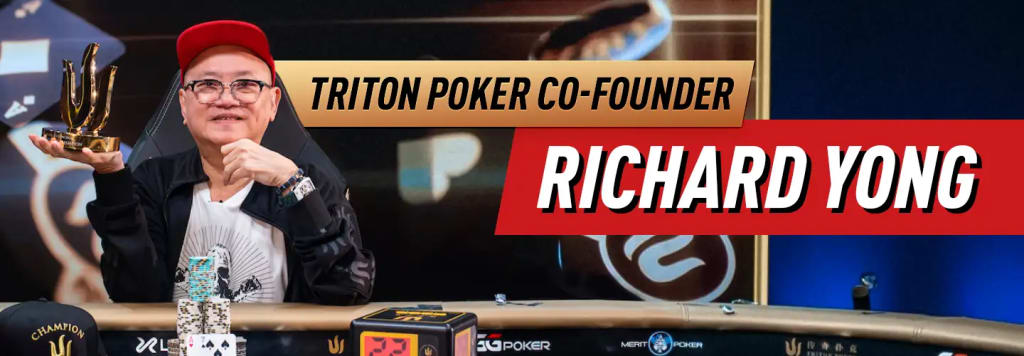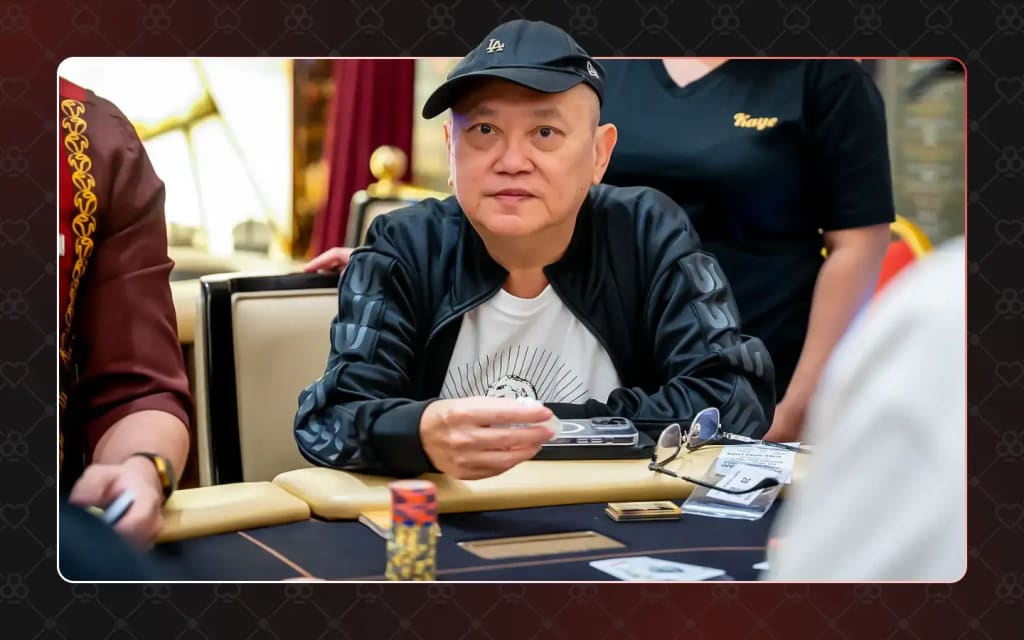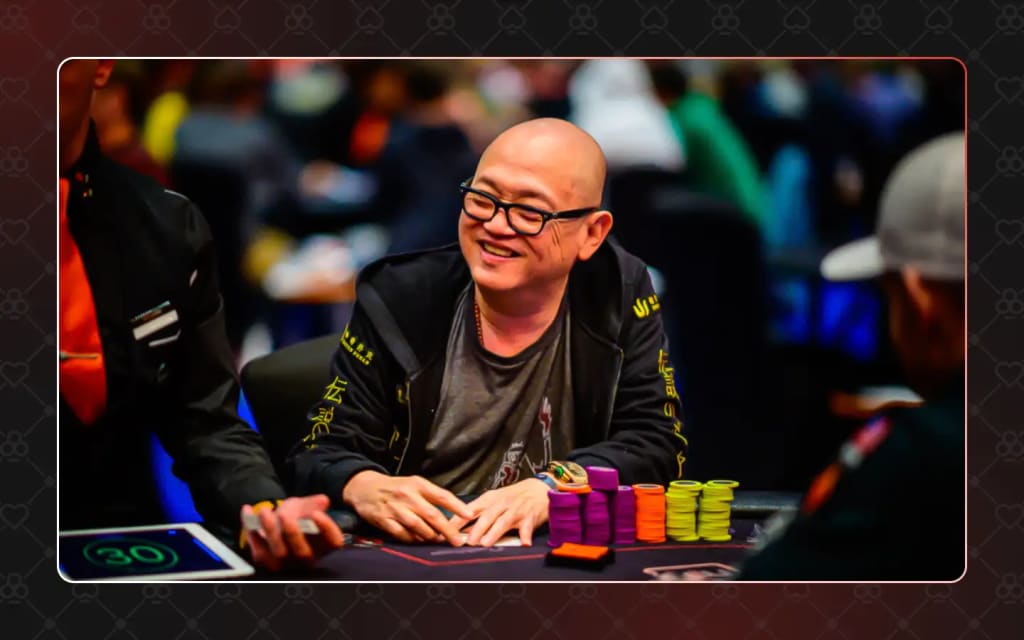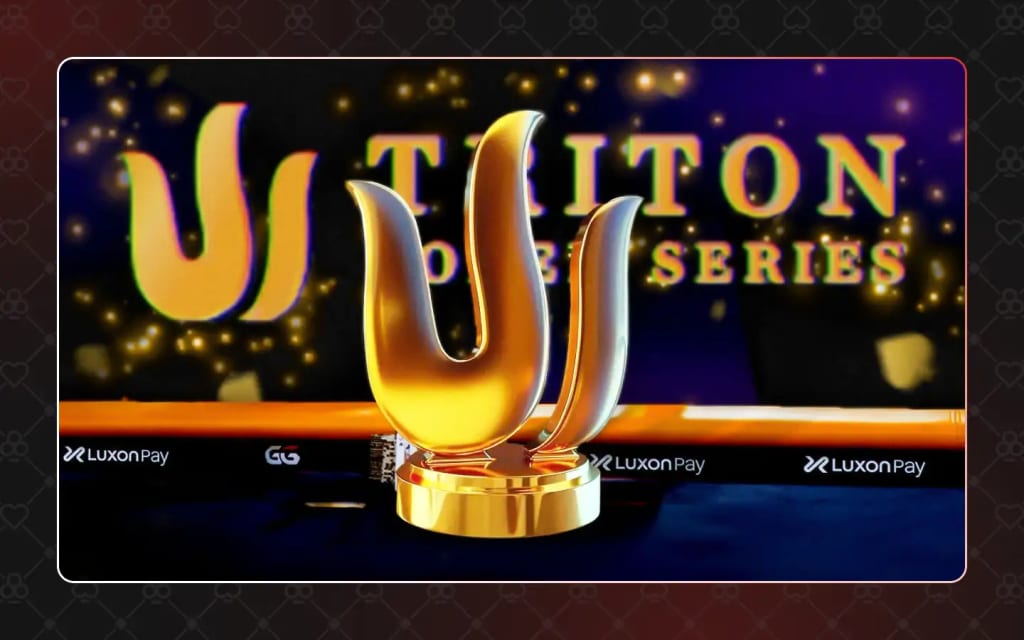The Man Who Revolutionized High-Stakes Poker: Triton Poker Co-Founder Richard Yong’s Net Worth, Career Wins, and Influence

Some people just seem destined to lead board meetings, ring opening bells, and close nine-figure deals. Richard Yong? He checks all those boxes. But just when you think he’s going to ride off into retirement with a legacy built in tech with a net worth over $1 billion, he takes a sharp left and builds a poker empire instead. And no, not as a hobby or vanity project. As a full-fledged, high-stakes institution. His life tournament earnings are above $17 million, but he still claims it is only a hobby for him.
Yong is far more than a businessman dabbling in cards. He’s the co-founder of the Triton Poker Series , arguably the most exclusive poker brand on the planet, and a respected regular in the highest-stakes games you’ll ever find. If you’ve seen a Triton final table featuring names like Phil Ivey, Tom Dwan, or Jason Koon, chances are Richard Yong was either seated among them or orchestrating things from behind the scenes.
But how does a Malaysian IT magnate end up shaping the future of professional poker? And why does his role in the game run deeper than most fans or even players realize? This is the story of a man who doesn’t just play the game: he redefines it.
From Kuala Lumpur to Global Cardrooms: Who Is Richard Yong?
Born on December 25, 1957, in Malaysia, Richard Yong didn’t exactly grow up surrounded by poker chips and playing cards. His early professional life was rooted in logic, numbers, and systems, specifically, the complex world of IT, data mining, and analytics. He built a successful career running multiple companies throughout the Asian continent, and gained a reputation as a highly disciplined operator with a sharp eye for strategy and opportunity.
But then something peculiar happened.
Between business trips, conference calls, and balance sheets, Yong stumbled into the world of high-stakes poker. And he didn’t approach it like a tourist; he approached it like a tactician. He didn’t play pub poker or casual side games. We’re talking invite-only, seven-figure cash games and high buy-in tournaments where the blinds are bigger than most annual salaries.

He first appeared on the international poker radar in 2011, entering a few major high roller events almost anonymously. But then, one appearance turned into many. High-stakes venues from Macau to Monaco started seeing his name pop up again and again. And when he played, he didn’t just survive, he competed.
Plenty of newcomers crash into the poker scene, make headlines, and vanish just as fast. Yong took a different path. He didn’t just want to win pots; he wanted to master the game’s psychological and mathematical nuances. For him, poker wasn’t a distraction from business; it was business, just in a new arena.
From Code to Cards: A Strategist’s Shift in Medium
Anyone who has spent time in the tech industry knows: success doesn’t come from knowing everything, it comes from knowing how to act when you don’t. Poker, at its core, operates on this same principle. It’s not about certainty. It’s about decision-making with imperfect information.
Yong recognized that immediately and exploited it.
He applied his executive mindset directly to the felt. He isn’t flashy, he’s not robotic, either. He sits, watches, calculates. And when the data (in this case, behavior, betting patterns, timing) suggests the edge is his, he doesn’t hesitate.
His poker strategy mirrors the decision-making process of a tech CEO: identify the pattern, assess the variables, and act decisively. Whether it’s market share or chip stacks, the logic is the same.
Pressure doesn’t rattle him; it sharpens him. Yong was built for moments where the stakes are high and the margin for error is very thin. In the poker world that is full of instinctive players who lean on gut feelings and ego-driven bluffs, he’s a different breed entirely. He plays with intention, not impulse. Every move he makes feels deliberate, like part of a blueprint only he can see. That quiet, calculating presence? It makes him very hard to read and nearly impossible to trap.
But here’s what might surprise you: he’s not some stone-faced machine, far from it. Yong respects the game deeply. He doesn’t just show up and play; he studies, adapts, and continually refines his approach. He’s always learning, always evolving. And that combination of humility, structure, and sharp strategic thinking? It’s rare, even among the best.
Richard Yong’s Poker Career Highlights
Let’s see the stats. Richard Yong has earned more than $17 million in recorded live tournament winnings. But that number only tells part of the story. His actual influence in poker, through cash games, reputation, and structural impact, is far greater.
Yong’s Notable finishes include:
- 2015 Aussie Millions $100K Challenge – 3rd Place for $1.47 million
- 2018 Triton Super High Roller, Jeju – 3rd Place for $2.13 million
- 2019 partypoker MILLIONS Bahamas – 2nd Place for $850,000
- 2023 Triton SHRS Cyprus – 1st Place for $323,000
But for every recorded result, there are dozens of private games, high-stakes battles, and behind-the-scenes plays that have shaped his career. In those rooms, where cameras aren’t rolling, he’s earned equal parts fear and respect.

Yong also doesn’t chase volume. While some pros travel nonstop to accumulate points and rankings, he’s quite selective. He shows up where it matters. He competes where the stakes are highest. He’s not here for padding résumés. He’s here to face the best and build a lasting impact.
Wai Kin Yong: The Family Force at His Side
Here’s a plot twist worthy of its own feature film: Richard Yong’s son, Wai Kin Yong, is a poker phenomenon in his own right. And he’s not following in his father’s footsteps; he’s sprinting alongside them.
Wai Kin didn’t climb the ranks of high-stakes poker by riding his father’s fame; he rather did it the hard way: with bold plays, fearless instincts, and a performance that is entirely his own. He has stacked up multiple Triton titles, cashed millions in winnings, and, along the way, crafted a style that is hard to miss. His approach is sharp, calculated, but with a kind of speed and aggression that keeps opponents off-balance. Blink, and you might miss the read, because he already made it.
Where Richard plays with the patience of a strategist, Wai Kin charges in like a storm. Quick. Unpredictable. Relentless. They couldn’t be more different in how they move through a hand, but both are lethal in their own way. Like opposite ends of a magnet. Or two sides of the same coin: polished, dangerous, and undeniably elite.
Sometimes they show up at the same event, both seated at the table, trading pots like old sparring partners. There are glances, quiet nods, maybe a smirk across the felt, but no favoritism. Just mutual respect. This isn’t a father teaching his kid to play cards. This is two professionals, both at the peak of their craft, pushing each other to stay sharp. It’s rare to see something like it in poker, or anywhere, really. A legacy not handed down, but earned, side by side.
And while Wai Kin has often credited Richard for shaping his strategic thinking, he’s also evolved into a formidable force with his own poker voice. In interviews, Wai Kin has described his father as not just a parent, but a “teacher in life and in logic.”
Their story adds a layer of humanity to the cold numbers and sunglasses. It’s a legacy built not just in chips, but in trust.
Earning a spot in the elite club of top poker players is not an easy task. It takes dedication, honing skills, and a lot of learning. You can start your journey towards poker fame online as well, so why not try Stake Poker with our special bonus code?
Triton Poker: A Brand, a Culture, a Movement
Now let’s talk legacy. Real, lasting legacy.
In 2016, Richard Yong joined forces with fellow high-stakes icon Paul Phua to launch the Triton Poker Series. The vision wasn’t just to host games. It was to revolutionize how high-stakes poker is played, viewed, and remembered.
And they did exactly that.
Triton became synonymous with exclusivity and excellence. It brought together the top 1% of the poker world, both seasoned professionals and ultra-wealthy amateurs, for elite-level competition with unmatched production values. With the launch of Triton One, the exclusive brand expands, exploring new territories.
So what makes Triton different from every other tournament series out there?
To begin with, it’s not open to just anyone. The entry lists are exclusive, reserved for VIPs, where skill and status are equally valued. The invited are usually an intentional mix of elite poker professionals and extremely wealthy amateurs.
Then there’s the setting. We’re talking high-gloss venues like Monte Carlo, Jeju, Cyprus, and London, places that feel more like scenes from James Bond movies than standard poker stops.
And the prize pools? They’re staggering. Six, seven, even eight-figure payouts aren’t unusual; they’re expected.
But Triton isn’t just about what happens at the tables. It’s about what surrounds it. From the beginning, philanthropy was woven into its DNA. Millions have been raised for global charities—not as an afterthought, but as a core part of the mission.
And that’s just the surface.
Where Triton truly set a new standard is in how poker is presented: the production quality, the live-streamed drama, and the storytelling are something we have never seen before. Triton’s YouTube channel alone has transformed how fans engage with the game, making poker not just a competition, but an experience: thrilling, educational, and binge-worthy.
And behind it all, Richard Yong isn’t some figurehead. He’s hands-on, designing, refining, and elevating. He doesn’t just show up to play. He helps shape the very way the game is played, seen, and remembered.

Triton isn’t just a brand he co-founded. It’s his vision in motion—arguably one of the most transformative forces in modern poker.
The Scandal That Didn’t Stick
Of course, no public figure navigates a path without turbulence.
Richard Yong was arrested in Las Vegas during the 2014 FIFA World Cup. This was the time his career in gambling took an unexpected turn. Allegedly, he was connected to an illegal sports betting ring. The news broke fast, the headlines ran hot, and in the tightly knit world of high-stakes poker, the whispers spread even quicker.
But as the dust settled, so did the case. The details, as it turned out, were murky at best. Allegations floated, but nothing stuck. The legal ground beneath the story crumbled quietly, and eventually, the case was dropped. No conviction. No courtroom drama. Just a brief, chaotic chapter in an otherwise carefully written career.
Yong was released on bail, with support from two poker legends: Phil Ivey and Dan Cates, who reportedly provided financial assistance. In the end, the charges were dropped, and no conviction was made.
It could’ve ended his poker career. It didn’t.
Instead, Richard Yong quietly returned to the felt. No loud rebuttals, no drama. Just work, just presence. And slowly, without needing to prove anything, he rebuilt his image through performance and integrity.
Among poker’s elite, that kind of comeback isn’t just respected, it’s revered. Resilience, after all, is a language that poker speaks fluently.
Silence, Precision, and Pressure
At the table, Richard Yong is easy to miss, that is, until he moves.
His game isn’t showy. It’s surgical. His timing? Razor-sharp. His composure? Near-mythical.
- Pre-flop decisions grounded in classic fundamentals
- Post-flop strategy that blends math with experience
- Reads built not just on numbers, but on subtle human behavior
He won’t trash-talk. He won’t overreact. He’ll just calmly execute a move that leaves pros second-guessing themselves.
But his real edge is his adaptability. Yong never plays on autopilot; instead, he studies each table and adjusts his game plan based on opponent types, constantly evolving it. Against young hyper-aggressive pros, he tightens. Against veterans, he opens up and gets creative.
And perhaps most notably, Yong has become a symbol of representation. As an Asian powerhouse in a game long dominated by Western narratives, he’s helped push open doors for a new generation of players worldwide.
Giving the Game a Greater Purpose
Poker can be a game of excess. However, under Yong’s guidance, it has. However, under Yong’s guidance, it has also become a platform for good.
Through Triton, Yong helped build one of the few elite poker circuits with philanthropy at its core. Each event allocates a portion of the prize pool, or side funds, to global charity organizations, such as One Drop, as well as children’s hospitals and community foundations, which have benefited directly.
This isn’t an afterthought. It’s a principle. Yong has spoken about wealth needing direction. That success without contribution is hollow. He’s brought that ethic to the table, literally.
And players have embraced it. For many, the opportunity to compete at the highest levels and contribute to real-world causes makes Triton not just prestigious, but meaningful.
The Legacy Yong Is Still Building
Poker has always had its share of overnight stars, one-hit wonders, quick exits, and short-lived streaks. But Richard Yong? He’s stayed. He’s grown. He’s built. And he’s still here, navigating high-stakes tables and high-impact decisions with the same quiet fire he had at the start.
Richard Yong is not just a businessman who plays poker. He is a visionary who transformed how it is played, how it is seen, and who gets to play it at the top.
He doesn’t just sit at the table. He defines it. And that kind of legacy? That’s not luck. That’s presence, precision, and purpose, all in one.



































